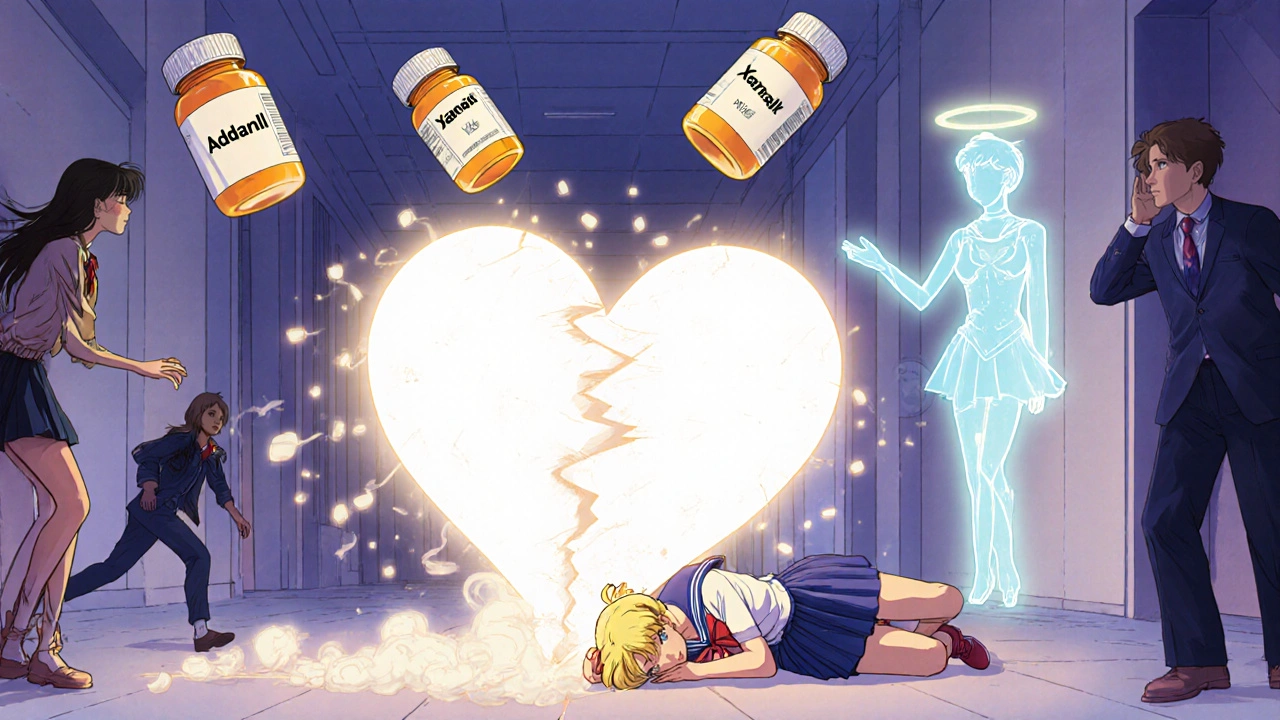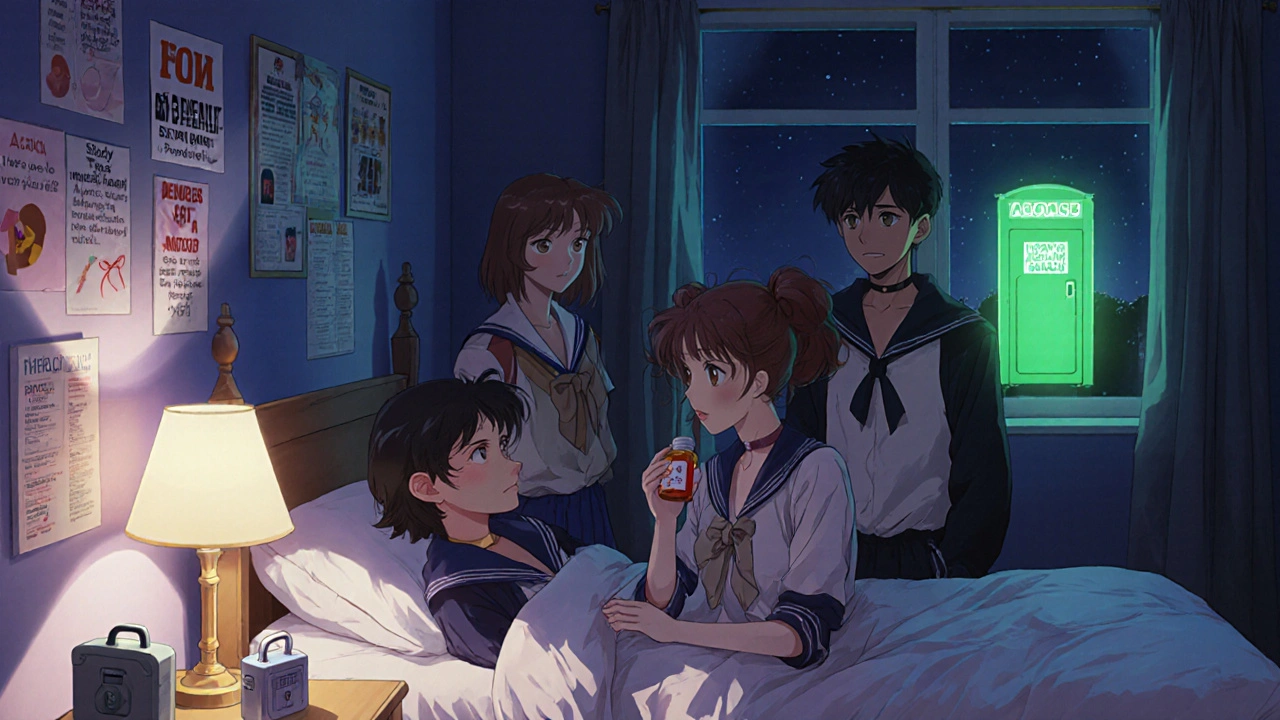Every year, thousands of college students start taking prescription meds-some with a doctor’s note, others without. Adderall for late-night study sessions, Xanax for exam stress, oxycodone for a pulled muscle. It’s easy to think, It’s prescription, so it’s safe. But here’s the truth: medication safety isn’t just about taking the right dose. It’s about knowing who you’re sharing it with, where you’re storing it, and what your body really needs.
Why College Students Are at Higher Risk
Young adults aged 18 to 25 are the most likely age group to misuse prescription drugs. According to the National Survey on Drug Use and Health, nearly 1 in 7 college students have used a prescription medication without a prescription at least once. Stimulants like Adderall and Ritalin top the list-used by 75% of those misusing prescriptions. Why? Academic pressure. Sleep deprivation. The belief that if it’s legal when prescribed, it’s harmless when borrowed. But the numbers don’t lie. A 2023 study found that 7.2% of college students misused stimulants in the past year-a rise from 5.4% just five years ago. And it’s not just about staying awake. Many students use these drugs to cope with anxiety, depression, or loneliness. The problem? These meds weren’t made for that. Stimulants can cause heart palpitations, panic attacks, and dependence. One student from Ohio told campus health staff, “I thought I was just boosting my grades. Turns out I was trading sleep for panic attacks.”Where Do These Drugs Come From?
Most students don’t buy Adderall off the street. They get it from friends. Roommates. Older siblings. Classmates who were prescribed it for ADHD. A 2021 study of 312 college students found that 60% of misused prescriptions came from someone they knew. That’s not black market. That’s a shared medicine cabinet. And it’s not just stimulants. Painkillers like Vicodin and sedatives like Xanax are also commonly shared. One University of California survey found that 42% of students knew exactly where to get prescription drugs on campus without a prescription. That’s not a rumor. That’s a system. And it’s dangerous.The Real Dangers of Sharing Medication
Prescription drugs aren’t candy. Even if someone else took them fine, your body reacts differently. A 150-pound student with ADHD might handle 20mg of Adderall. A 120-pound student with no diagnosis might have a seizure. Stimulants raise blood pressure and heart rate. For someone with an undiagnosed heart condition, that’s a recipe for disaster. The CDC reports that stimulant-related ER visits among young adults tripled between 2005 and 2010. And it’s getting worse. In 2022, nearly 14% of high school seniors had misused opioids. That’s not a distant problem. That’s the next freshman class walking onto campus. Even “safe” meds like sleeping pills can backfire. Taking Xanax to sleep before an exam might help you nod off-but it messes with your memory consolidation. You might sleep better, but you’ll remember less. And withdrawal? That’s when anxiety spikes harder than before you started.
How to Store Medication Safely
If you’re prescribed something, lock it up. Not on your nightstand. Not in your desk drawer. A small lockbox, a locked medicine cabinet, even a locked drawer in your dorm room makes a difference. The University of Florida’s “Safe Meds” program gave students free lockboxes-and saw a 18% drop in stimulant misuse over two years. Why? Because if it’s hard to access, it’s harder to share. And sharing is the biggest risk factor. Also, don’t leave your meds in your car. Heat and humidity ruin pills. A bottle of pills left in a hot car can lose potency-or turn toxic. Store them at room temperature, away from sunlight. Keep them in their original bottles with the label intact. That way, you know the dose, the name, and the expiration date.What to Do With Old or Unused Pills
Don’t flush them. Don’t throw them in the trash. Don’t give them to a friend. Most college campuses now have drug disposal kiosks-often in the health center or pharmacy. The FDA and DEA recommend these take-back programs because they’re safe, secure, and environmentally friendly. If your campus doesn’t have one, check with your local pharmacy. Many offer mail-back envelopes or drop-off bins. A 2022 study showed that when students were reminded during routine health visits, medication disposal rates jumped by 35%. It’s not complicated. Just ask.What Colleges Are Doing About It
The good news? More schools are stepping up. In 2010, only 28% of colleges had a dedicated medication safety coordinator. By 2023, that number jumped to 73%. Schools like the University of Michigan now combine academic coaching with medication safety workshops. Their “Wolverine Wellness” program cut stimulant misuse by 22% and increased students using tutoring services by 47%. Other schools run peer-led education campaigns. Students talk to students. It works better than posters. The “Talk. They Hear You.” campaign, adapted by over 300 campuses, trains upperclassmen to have honest conversations about pressure, mental health, and meds. Pharmaceutical companies have also stepped in. Shire, maker of Adderall, gave $4.2 million to college health programs in 2022. And new abuse-deterrent formulations are being tested-pills that turn to gel when crushed, making them harder to snort or inject. Early results show a 15% drop in misuse.

Denny Sucipto
November 17, 2025 AT 10:00Man, I used to crush Adderall like it was candy during finals. Thought I was winning at life until I had a panic attack in the library and cried over a textbook. Turns out my brain wasn't built for 20mg of speed and zero sleep. Now I nap for 20 minutes, drink water, and actually remember what I studied. No magic pill beats rest.
Also, lock your meds. My roommate took my Xanax once and spent 3 days in bed like a zombie. Not cool.
You’re not lazy if you need help. You’re human.
Emanuel Jalba
November 19, 2025 AT 02:07THIS IS WHY WE CAN’T HAVE NICE THINGS 😭
Somebody’s mom gave them Oxy for a sprained ankle and now the whole dorm is snorting it like it’s glitter at a rave. I swear to god, if I see one more person walking around like a zombie with a coffee cup and a prescription bottle, I’m calling campus security. This isn’t college. This is a pharmaceutical circus.
And yes, I’m that guy who reports it. You’re welcome, future me.
Heidi R
November 20, 2025 AT 20:48It’s not about safety. It’s about accountability. If you’re taking meds you weren’t prescribed, you’re not a victim-you’re a liability. And frankly, your poor decision-making is exhausting everyone else who actually tries to be responsible.
Brenda Kuter
November 21, 2025 AT 14:04Did you know Big Pharma is secretly funding these ‘safe meds’ campaigns? They want you to think locking your pills is the solution-so they keep selling more. The real problem? They’re selling these drugs like candy in the first place. I saw a doc in Philly prescribe Adderall to a 17-year-old for ‘focus issues’-no ADHD diagnosis, no therapy, just a script and a smile. This isn’t healthcare. It’s a product placement.
They’re not trying to help you. They’re trying to hook you.
Iska Ede
November 23, 2025 AT 05:47Ohhh so now we’re supposed to nap instead of taking Adderall? Cute. Next you’ll tell me to ‘just breathe’ when I’m drowning in essays and my professor says ‘this is due at 3am.’
Yeah right. I’ll nap when pigs fly. But hey, thanks for the advice, Captain Optimism. I’ll just keep my 20mg of hope in my pocket.
Gabriella Jayne Bosticco
November 24, 2025 AT 17:14My cousin got prescribed Xanax for anxiety during med school. She locked hers up, took it exactly as directed, and still ended up in therapy for six months. The meds didn’t fix her-they just gave her a temporary mask. Real help? Talking to someone who gets it. Not a bottle.
Also, I used to leave my pills in my dorm drawer. Now I keep them in a locked tin in my backpack. Small change. Big difference.
Sarah Frey
November 26, 2025 AT 01:04It is imperative to recognize that the normalization of off-label prescription drug use among young adults represents a significant public health concern. The conflation of legal status with safety is both scientifically inaccurate and socially perilous. Institutional interventions, including secure storage protocols and accessible disposal mechanisms, are not merely prudent-they are ethically obligatory. One must also acknowledge the role of systemic academic stressors in precipitating this behavior. Support structures must be expanded, not stigmatized.
Kristina Williams
November 26, 2025 AT 15:46Wait-so you’re telling me the government knows this is happening and still lets pharmacies hand out these pills like candy? That’s not negligence. That’s intentional. They want us addicted so they can sell us rehab later. I read a blog once that said the DEA gets funding based on how many prescriptions they ‘monitor.’ So they let it spread… then they ‘fix’ it. Classic.
Shilpi Tiwari
November 28, 2025 AT 14:54From a pharmacokinetic standpoint, the bioavailability of orally ingested stimulants in non-ADHD populations exhibits a significantly elevated Cmax and reduced half-life due to altered metabolic enzyme expression, particularly CYP2D6 polymorphisms. This increases the risk of catecholamine surge-induced cardiotoxicity, especially in individuals with undiagnosed long QT syndrome. The current public health messaging fails to account for pharmacogenomic variability, rendering generic safety advisories inadequate. We need personalized risk stratification, not one-size-fits-all lockboxes.
Christine Eslinger
November 28, 2025 AT 21:39It’s funny how we treat medication like a cheat code when it’s really just a tool. You wouldn’t use a chainsaw to peel an apple. But we use Adderall to fix sleep deprivation like it’s a band-aid on a broken leg.
The real win isn’t staying up all night-it’s learning how to work smarter. I used to think I needed pills to focus. Turns out, I just needed a quiet room, a timer, and the courage to say no to distractions.
And yeah, if you’re feeling like you can’t function without it? That’s not weakness. That’s your body screaming for help. And you deserve to hear it.
You’re not alone. And you don’t have to do this alone.
Holly Powell
November 30, 2025 AT 01:01Let’s be honest-this entire post is performative virtue signaling. You’re not trying to educate. You’re trying to make students feel guilty so universities can tick off a compliance box. The real issue? No one teaches coping skills. No one teaches time management. Instead, we hand out pills and call it ‘support.’ Pathetic.
Katelyn Sykes
December 1, 2025 AT 22:56My roommate took my sleep aid once and woke up screaming at 3am thinking her walls were breathing. I locked my stuff after that. No drama. No questions. Just a little lockbox and peace of mind.
Also-disposal bins are everywhere now. Just ask your health center. Seriously. It’s easier than ordering pizza.
Gabe Solack
December 3, 2025 AT 20:51Used to share my Ritalin with my study buddy. He got hooked. Lost his scholarship. Now he’s in a rehab program. I feel like trash for even thinking it was okay.
Don’t be like me. Lock it. Don’t share. And if you’re struggling? Text the campus hotline. They don’t judge. They just help.
❤️